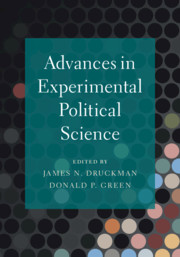Book contents
- Frontmatter
- Contents
- List of Figures
- List of Tables
- List of Boxes
- List of Contributors
- Acknowledgements
- 1 A New Era of Experimental Political Science
- Part I Experimental Designs
- Part II Experimental Data
- Part III Experimental Treatments and Measures
- Part IV Experimental Analys is and Presentation
- Part V Experimental Reliability and Generalizability
- 18 Transparency in Experimental Research
- 19 Threats to the Scientific Credibility of Experiments: Publication Bias and P-Hacking
- 20 What Can Multi-Method Research Add to Experiments?
- 21 Generalizing Experimental Results
- 22 Conducting Experiments in Multiple Contexts
- Part VI Using Experiments to study Identity
- Part VII Using Experiments to Study Government Actions
- Author Index
- Subject Index
18 - Transparency in Experimental Research
from Part V - Experimental Reliability and Generalizability
Published online by Cambridge University Press: 08 March 2021
- Frontmatter
- Contents
- List of Figures
- List of Tables
- List of Boxes
- List of Contributors
- Acknowledgements
- 1 A New Era of Experimental Political Science
- Part I Experimental Designs
- Part II Experimental Data
- Part III Experimental Treatments and Measures
- Part IV Experimental Analys is and Presentation
- Part V Experimental Reliability and Generalizability
- 18 Transparency in Experimental Research
- 19 Threats to the Scientific Credibility of Experiments: Publication Bias and P-Hacking
- 20 What Can Multi-Method Research Add to Experiments?
- 21 Generalizing Experimental Results
- 22 Conducting Experiments in Multiple Contexts
- Part VI Using Experiments to study Identity
- Part VII Using Experiments to Study Government Actions
- Author Index
- Subject Index
Summary
In recent years, the credibility of social science has been tarnished by widely discussed replication failures and a lack of reporting about what exactly researchers did when conducting their studies.In response, scholars, policymakers, and the public have called for greater transparency in social science research.In this chapter, I emphasize that transparency is an important public good.However, because individual researchers lack incentives to contribute to this public good, institutional solutions are needed.I discuss three institutions that facilitate transparency in experimental research:1) pre-registration, 2) reporting guidelines, and 3) the Data Access and Research Transparency (DA-RT) initiative.I also offer recommendations for what kinds of information researchers should pre-register and report in their published articles and appendices.I conclude with a discussion of how researchers might be incentivized to make greater use of these institutions when designing, conducting, and publishing their experiments.
Keywords
Information
- Type
- Chapter
- Information
- Advances in Experimental Political Science , pp. 339 - 353Publisher: Cambridge University PressPrint publication year: 2021
Accessibility standard: Unknown
Why this information is here
This section outlines the accessibility features of this content - including support for screen readers, full keyboard navigation and high-contrast display options. This may not be relevant for you.Accessibility Information
- 1
- Cited by
